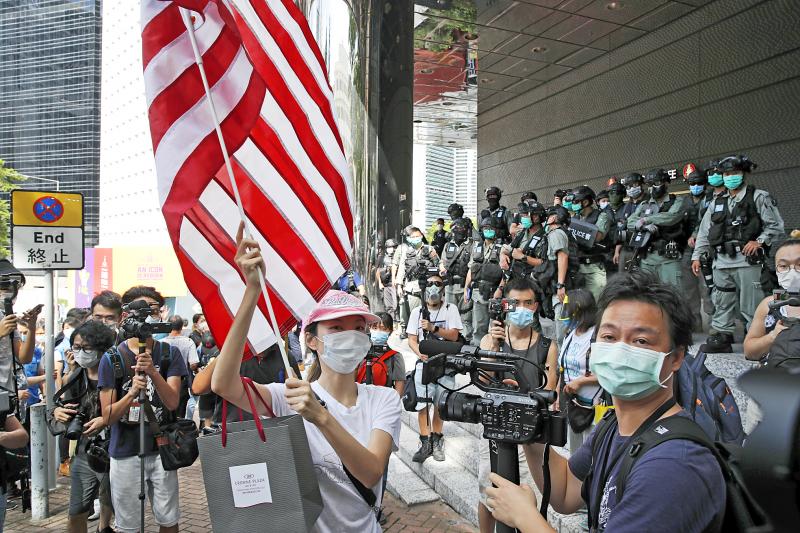The US yesterday issued a sweeping new advisory warning against travel to mainland China and Hong Kong, citing the risk of “arbitrary detention” and “arbitrary enforcement of local laws.”
The advisory is likely to heighten tensions between the two, which have spiked since Beijing’s imposition in June of a new National Security Law in Hong Kong that has already been met with a series of US punitive actions.
The statement warned US citizens that China imposes “arbitrary detention and exit bans” to compel cooperation with investigations, pressure family members to return to China from abroad, influence civil disputes and “gain bargaining leverage over foreign governments.”

Photo: AP
“US citizens traveling or residing in China or Hong Kong, may be detained without access to US consular services or information about their alleged crime. US citizens may be subjected to prolonged interrogations and extended detention without due process of law,” the advisory said.
In Hong Kong, China “unilaterally and arbitrarily exercises police and security power,” the advisory said, adding that new legislation covers offenses committed by non-Hong Kong residents or organizations outside the territory, possibly subjecting US citizens who have publicly criticized China to a “heightened risk of arrest, detention, expulsion, or prosecution.”
When in Hong Kong, US citizens are “strongly cautioned to be aware of their surroundings and avoid demonstrations,” it said.
Chinese Ministry of Foreign Affairs spokesman Wang Wenbin (汪文斌) told reporters at a daily briefing yesterday that the US should “fully respect the facts and should not engage in unwarranted political manipulation” when issuing such advisories.
“China has always protected the safety and legal rights of foreigners in China in accordance with law. China is one of the safest countries in the world,” Wang said.
“Of course, foreigners in China also have an obligation to abide by Chinese laws.”

CHAOS: Iranians took to the streets playing celebratory music after reports of Khamenei’s death on Saturday, while mourners also gathered in Tehran yesterday Iranian Supreme Leader Ayatollah Ali Khamenei was killed in a major attack on Iran launched by Israel and the US, throwing the future of the Islamic republic into doubt and raising the risk of regional instability. Iranian state television and the state-run IRNA news agency announced the 86-year-old’s death early yesterday. US President Donald Trump said it gave Iranians their “greatest chance” to “take back” their country. The announcements came after a joint US and Israeli aerial bombardment that targeted Iranian military and governmental sites. Trump said the “heavy and pinpoint bombing” would continue through the week or as long

TRUST: The KMT said it respected the US’ timing and considerations, and hoped it would continue to honor its commitments to helping Taiwan bolster its defenses and deterrence US President Donald Trump is delaying a multibillion-dollar arms sale to Taiwan to ensure his visit to Beijing is successful, a New York Times report said. The weapons sales package has stalled in the US Department of State, the report said, citing US officials it did not identify. The White House has told agencies not to push forward ahead of Trump’s meeting with Chinese President Xi Jinping (習近平), it said. The two last month held a phone call to discuss trade and geopolitical flashpoints ahead of the summit. Xi raised the Taiwan issue and urged the US to handle arms sales to

BIG SPENDERS: Foreign investors bought the most Taiwan equities since 2005, signaling confidence that an AI boom would continue to benefit chipmakers Taiwan Semiconductor Manufacturing Co’s (TSMC, 台積電) market capitalization swelled to US$2 trillion for the first time following a 4.25 percent rally in its American depositary receipts (ADR) overnight, putting the world’s biggest contract chipmaker sixth on the list of the world’s biggest companies by market capitalization, just behind Amazon.com Inc. The site CompaniesMarketcap.com ranked TSMC ahead of Saudi Aramco and Meta Platforms Inc. The Taiwanese company’s ADRs on Tuesday surged to US$385.75 on the New York Stock Exchange, as strong demand for artificial intelligence (AI) applications led to chip supply constraints and boost revenue growth to record-breaking levels. Each TSMC ADR represents

Pro-democracy media tycoon Jimmy Lai’s (黎智英) fraud conviction and prison sentence were yesterday overturned by a Hong Kong court, in a surprise legal decision that comes soon after Lai was jailed for 20 years on a separate national security charge. Judges Jeremy Poon (潘兆初), Anthea Pang (彭寶琴) and Derek Pang (彭偉昌) said in the judgement that they allowed the appeal from Lai, and another defendant in the case, to proceed, as a lower court judge had “erred.” “The Court of Appeal gave them leave to appeal against their conviction, allowed their appeals, quashed the convictions and set aside the sentences,” the judges